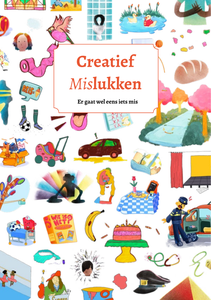Moet ieder bedrijfsonderdeel binnen de Rabobankorganisatie op zijn eigen wijze een afzonderlijk Management Informatiesysteem (MIS)ontwikkelen? Is het realistisch om een geintegreerd Executive Information System (EIS) op te zetten voor iedereen? Of is het beter om ieder een eigen EIS te geven, maar dan wel volgens een standaard recept? De antwoorden op deze vragen zijn het centrale thema in dir artikel. Ook lichten wij het begrip EIS tie in vergelijking met het traditionele MIS. En wij informeren u over een EIS-proef binnen het WAB.
DOCUMENT

Er gaat wel eens iets mis. Daar kun je flink van balen. Toch is het vaak wel de moeite waard om te proberen, te durven en te doen, zelfs als het kan mislukken. Iedereen heeft wel eens iets dat mislukt. Alles kan en hoeft niet altijd alleen maar goed te gaan. Kijk maar naar de verhalen in dit boek.
DOCUMENT

Improved cookstoves aimed at reducing exposure to indoor air pollution have had a lasting presence in development and health discussions. Through this article we contribute to current debates in the field by reflecting on our experiences during a cookstove participatory project in two ‘non-notified’ communities, or ‘slums,’ in Bangalore, India. We interrogate the alignment between some of the central tenets and methods of participation and the lived experiences of participating communities. The current predominant recommendations focus on developing and implementing cookstoves tailored for user needs. Yet, the project implementation entered a space of uncertainty where the priorities and needs of participants were diverse and changing. While urban infrastructures related to housing and work security, drainage systems, access to health care, and aspects of governance, citizenship and rights, may seem to fall outside the scope of ICS projects, our experiences show how inescapably they shape participatory processes and technologies. We highlight the need to take a closer look at how we can include these broader and changing priorities and needs in our methodologies and reflect on how we can better respond and align them with the ways in which people live.
MULTIFILE

The intellectual endeavour taken in this article is to be critically reflexive of the term 'integration' and its use in society, recognizing the power of discourse and the fact that words, and their use, have consequences. It is a term which is presented as an end goal for select groups, a potential threat to society if not adequately maintained, and which justifies the development of various programmes and policies initiated to support these selected groups in the attainment of this goal. The term is used in policy and everyday conversation in a taken-for-granted way, yet at the same time, despite its enormous power and pervasiveness, it is never clearly or structurally defined.
DOCUMENT
This article provides a nano (hyperlocal) view of climate change mitigation by viewing regenerative organizing through the eyes (as well as bodies and senses, etc.) of the households engaged in community-based energy projects. By showing what humans make up for in the largely absent relationship between nature and technology in these projects, we envision an incremental extension of the literature on community-based energy. The radically different contribution we aim to make is a tripartite imbrication that brings in natural agency alongside the human and the technical but specifies precisely how nano (smaller than micro) embodied practices afford mis- and realignments. https://doi.org/10.1177/1086026619886841 LinkedIn: https://www.linkedin.com/in/helenkopnina/
MULTIFILE

In een MiS is verantwoordelijkheid nemen door een verdachte een voorwaarde om 1) de mediation te starten en 2) voor een succesvol verloop daarvan. Door het onderzoek dat wij uitvoeren willen we verduidelijken wat het nemen van deze verantwoordelijkheid inhoudt. Tijdens een MiS blijkt het voor de verdachte niet altijd gemakkelijk om de verantwoordelijkheid te nemen, zeker niet als het gaat om een zware verantwoordelijkheid, zoals in strafzaken nogal eens speelt. Zelfbeschermingsmechanismen als ontkenning, bagatellisering, verschuiving van verantwoordelijkheid en dissociatie treden vrijwel automatisch in werking. De mediators hebben tijdens dit proces een ondersteunende rol waar het gaat om het nemen van verantwoordelijkheid door een verdachte. Dat betekent begrip voor de verdachte, die niet alleen ‘dader’ is maar ook mens. Maar ook moeten mediators soms confronteren als allerlei zelfbeschermingsmechanismen de verdachte in weg zitten om verantwoordelijkheid te nemen. Het onderzoek wil ook bijdragen aan (uitbreiding van) het arsenaal aan effectieve interventies inzake het nemen van verantwoordelijkheid door de verdachte.
DOCUMENT

Henry Ford onderscheidt drie verschillende generaties binnen outsourcing: coming together, staying together en working together. 'Coming together is a beginning. Staying together is progress. Working together is succes.' Maar zijn we overal al in de fase van working together? Ik denk van niet. Daarom is het boeiend om in de special edition van MIS Quarterly eens te lezen wat de status van de wetenschap is omtrent offshoring.
DOCUMENT
